Steve Kaplan and Jason Levien: Meet Swansea City's US owners
- Published

Jason Levien (back left) and Steve Kaplan (back centre) watched Swansea's 2-0 loss at home to Hull with chairman Huw Jenkins (front left)
One is a millionaire and part-time baseball coach, the other a distinguished sporting chief executive and former college basketball player. They are also the newest American owners of a Premier League football club.
Steve Kaplan and Jason Levien led a consortium which bought a 68% controlling stake in Swansea City in July, capping the club's rise from bottom-tier financial ruin to the wealth and global renown of the top flight.
As is often the case with foreign takeovers, the Americans' arrival prompted scepticism from some, with the club's supporters' trust raising concerns about the nature of Kaplan and Levien's investment.
Swansea are the only Premier League club with a fan representative on the board, so it is understandable that the supporters would scrutinise any change in stewardship.
It is that communal spirit which first attracted Kaplan, the head of an investment company and vice-chairman of basketball franchise Memphis Grizzlies, and Levien, managing general partner of Major League Soccer team DC United.
"The story of this community and a team which came from the fourth division and marched its way up into the Premier League, and not only entered the Premier League but has done quite well - that's a compelling story," says Kaplan.
"We did look at other clubs but there were a number of things which drew us to the club. One was the relationship with the fans - the relationship between the club and the fans is among the strongest in the league.
"It's the only Premier League club in Wales, so we've got a wide geographic area where we have the only club in the league. And then we were attracted to the style of play. We were looking for a club that has a sustainable model.
"Given the size of our market and the size of our stadium, can we be sustainable and stay in the Premier League and be competitive in the Premier League over the long term? We firmly believe Swansea can be and will be."
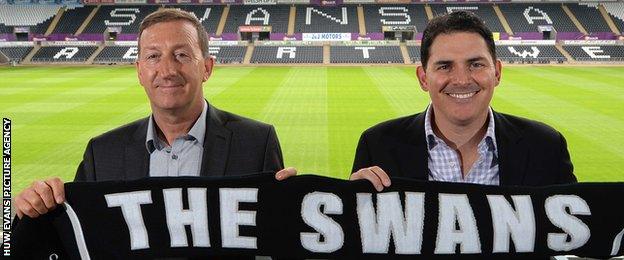
Huw Jenkins (left, pictured with Jason Levien) was appointed an OBE in 2015 for services to Welsh football
What's in it for them?
Sustainability is a recurrent theme as Kaplan and Levien outline their vision for Swansea during our conversation at the Liberty Stadium.
They are not planning a dramatic overhaul of the club's hierarchy. Instead, they intend to build on the pragmatism and prudence which has laid the foundation for the Swans' decade of remarkable success.
When a group of mostly local businessmen, led by current chairman Huw Jenkins, took charge of Swansea in 2002, the club was in the bottom division and in grave financial danger.
The Swans were a game away from falling out of the Football League in 2003 but, 13 years later, they are enjoying their sixth successive season in the Premier League.
That is why Kaplan and Levien have kept Jenkins as chairman, while Swansea City Supporters' Trust has retained its 21% share and seat on the board.
So far, so good - but what some fans and curious onlookers want to know is why the Americans have invested. Put simply, what is in it for them?
"British football is the best in the world and the Premier League is at the top of the food chain, the pyramid of sport in the world," says Levien.
"So the opportunity to be involved in that level of competition for folks like Steve and I, who love sport so much and love the competition of sport, it's an exciting thing."
The Premier League is awash with more money than ever, with its latest TV rights contract generating a record £5.136bn for three seasons from the start of the current campaign.
Financially, it is clear why Kaplan and Levien would want a foothold in such a lucrative market. Beyond that, however, is their genuine love of sport.
In buying Swansea, they are merging their two lifelong passions - business and sport.
Swansea City's new owners watched their first game since their takeover as the Swans lost 2-0 to Hull
Who are Kaplan and Levien?
As principal and group founder of the Oaktree Capital investment firm, Kaplan is the man providing most of the American consortium's financial bulk.
But now he is semi-retired, the California-based investor has the time to pursue what he calls his "other career".
The son of a semi-professional baseball player, Kaplan has immersed himself in sport throughout his life, so his ownership of Swansea is as much a sporting venture as it is a business investment.
The father of six spends much of his spare time coaching his local youth baseball teams and one of his sons, Leo, was drafted by Major League Baseball team the Chicago White Sox.
"I'm a lover of sports and I'm highly competitive. I have a true passion for sport and winning," says Kaplan.
"It's something that I love, something that drives me to be involved in sports - you're in the game to win the game and that's why we're here."
Kaplan's eyes light up when he speaks about sport but, underneath the infectious zeal, there is a hint of the steely seriousness which has helped make him a prodigiously successful investor.
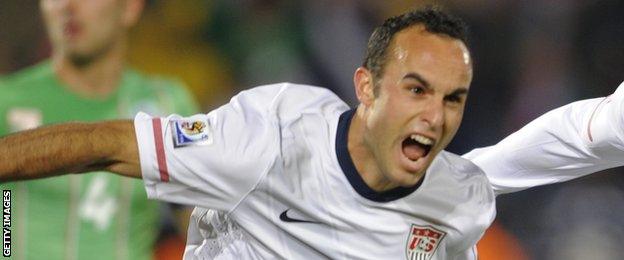
Former United States captain Landon Donovan is a part of the American consortium which has bought a controlling stake in Swansea
Having started his career as a lawyer, Kaplan worked his way up at an investment company before founding his own group, where he bought and improved "underperforming" companies.
He met Levien during the purchase of National Basketball Association franchise the Memphis Grizzlies, and says the two formed a working relationship like a "hand in glove".
The rapport was instant and Levien, who played basketball at Pomona College, quips of his sporting career: "I was born to be a point-guard, just not a very good one."
Like Kaplan, Levien worked as a lawyer before starting a firm which represented athletes. One of his highest-profile clients was British basketball players Luol Deng, whose $80m six-year contract signed in 2008 was then the largest in the history of the Chicago Bulls.
Levien then worked on the takeovers and purchases of various sports clubs before becoming managing general partner of DC United.
Both he and Kaplan had been to England to watch Premier League games and had been enamoured with the fervent atmospheres and breakneck speed of British football.
When the opportunity arose to buy a club, their interest in the sport intensified.

Record signing Borja indicates that the US owners will spend
'Faster, smarter, craftier'
Although Kaplan and Levien plan to keep much the same in their running of Swansea, they have identified areas for improvement.
They admire Jenkins' shrewd work in the transfer market and hope to enhance the Swans' recruitment with the aid of some methods favoured by American sport teams.
An increasing amount of football clubs use analytics in their search for prospective signings, and Levien believes an emphasis on data will benefit the club.
"The club has a very good track record in the past decade of finding players and we want to maintain that process and figure out ways of enhancing it," he says.
"Analytics is a part of that, increasing the scouting network and looking in new areas for players."
Kaplan nods and adds: "We're not going to outspend many other clubs in the Premier League. We've got to be a little bit faster, a little bit smarter, a little bit craftier."
Kaplan and Levien are wise enough not to reveal just how much money they have at their disposal for strengthening Swansea's squad.
The club-record signing of striker Borja Baston and the notable acquisition of World Cup winner Fernando Llorente are examples of their readiness to spend.
However, the departures of Wales captain Ashley Williams and Andre Ayew are reminders of the Swans' place in the Premier League's pecking order.
"Our message to fans is we are very focused on winning and continued success, and we think some of the players we've brought in during this transfer window are players who are going to help us on the pitch," Levien says.
"Players don't play forever and they don't play for the same club forever, and we've got to make the best decisions - decisions which are in the best interest of the club."
Subscribe to the BBC Sport newsletter, external to get our pick of news, features and video sent to your inbox.
- Published21 July 2016
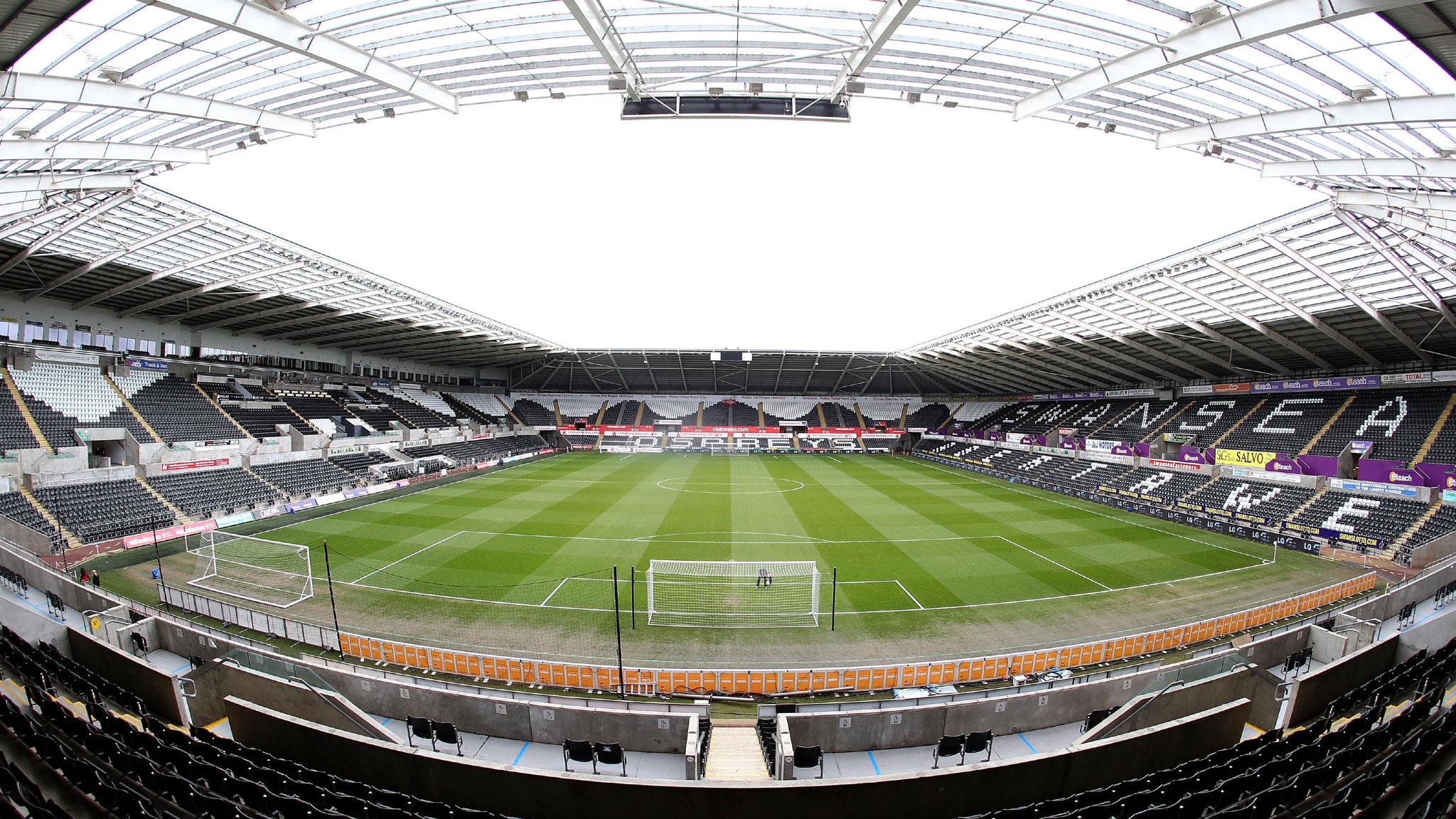
- Published20 April 2016
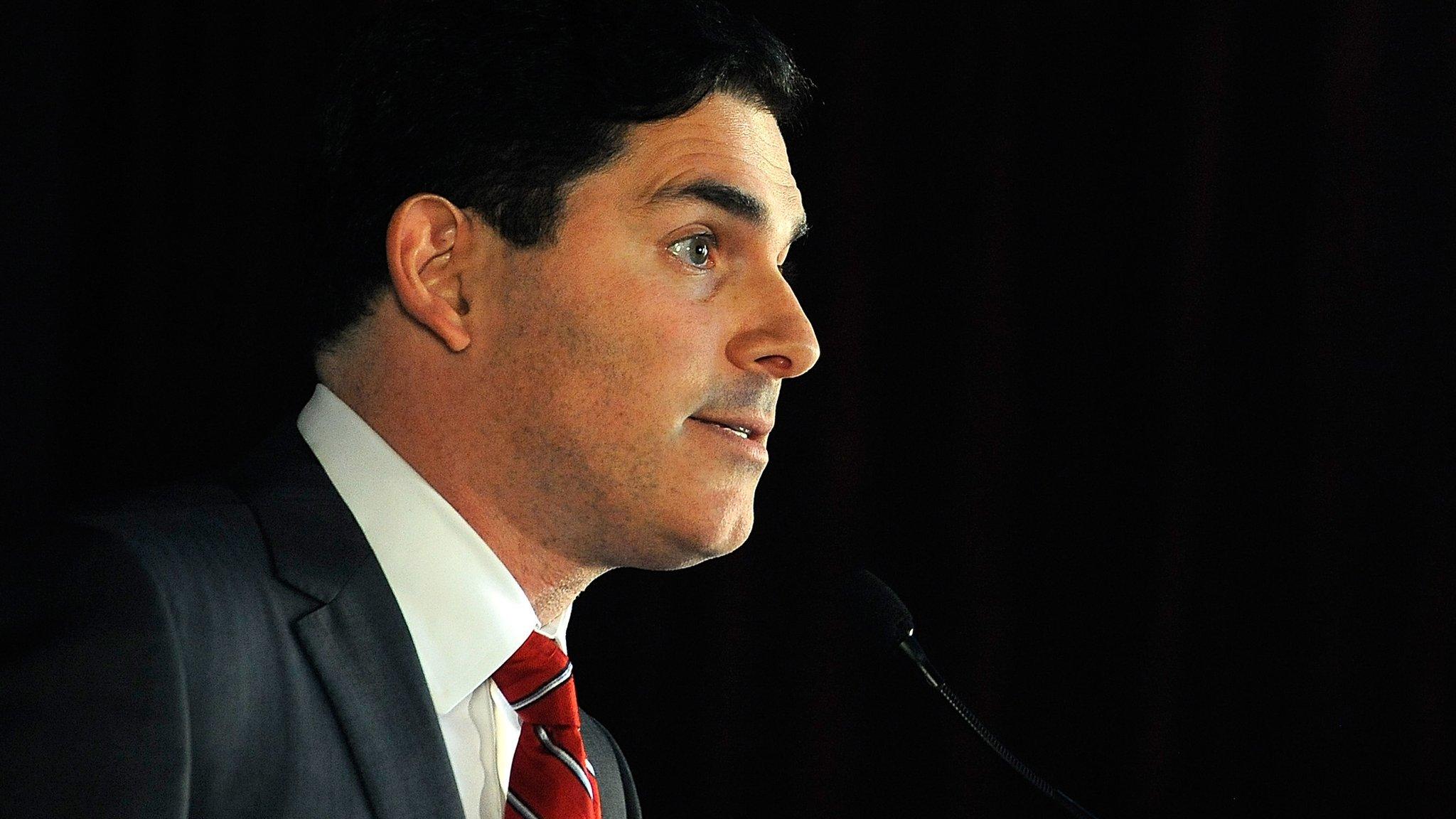
- Published10 April 2016
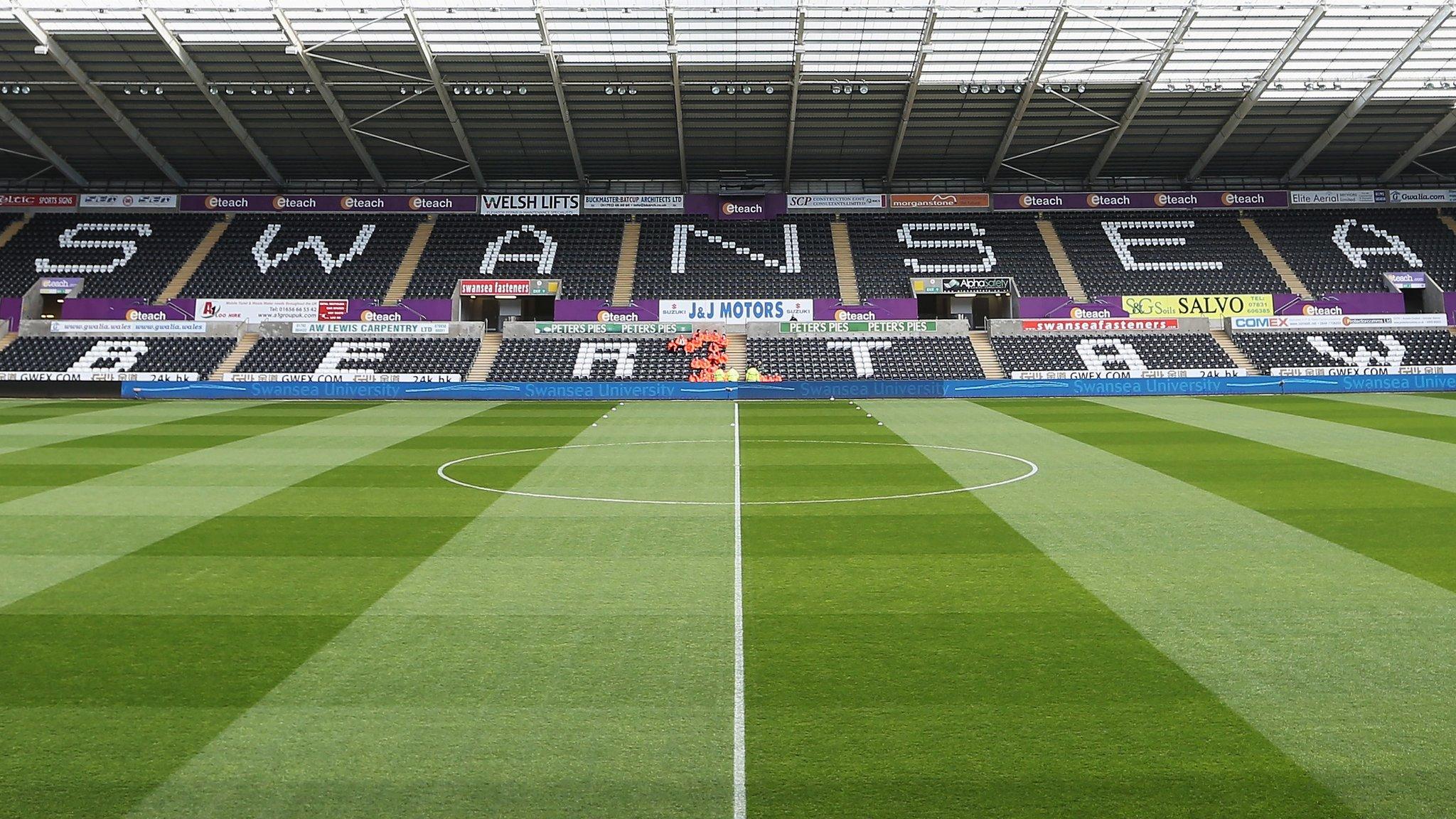
- Published14 January 2018
- Published7 June 2019
